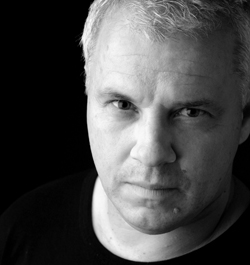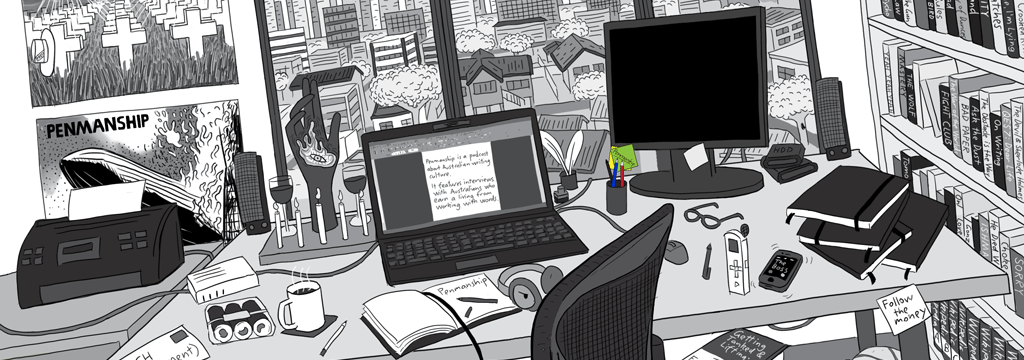Matthew Condon is an author and staff writer at Qweekend.
 Like John Birmingham, he’s a man who can alternate between writing fiction and non-fiction with apparent ease. I first met Matthew in 2010 when I interviewed and profiled him for The Weekend Australian Review, around the release of his excellent book Brisbane, which offered a unique and literary insight into the city where he grew up and later returned to while raising his family. Matthew is an acclaimed fiction writer who was first published in 1988 with The Motorcycle Café, a novel inspired by his experiences working at a petrol station. I’m less familiar with his fiction writing, though I thoroughly recommend his 1998 novel The Pillow Fight, which is about an abusive relationship written from the perspective of the male victim.
Like John Birmingham, he’s a man who can alternate between writing fiction and non-fiction with apparent ease. I first met Matthew in 2010 when I interviewed and profiled him for The Weekend Australian Review, around the release of his excellent book Brisbane, which offered a unique and literary insight into the city where he grew up and later returned to while raising his family. Matthew is an acclaimed fiction writer who was first published in 1988 with The Motorcycle Café, a novel inspired by his experiences working at a petrol station. I’m less familiar with his fiction writing, though I thoroughly recommend his 1998 novel The Pillow Fight, which is about an abusive relationship written from the perspective of the male victim.
In recent years his journalistic work has taken prominence: he is an associate editor at Queensland newspaper The Courier-Mail and a staff writer at Qweekend. Matthew was also editor of Qweekend for a year or so, and kindly published several stories of mine during his tenure. In 2013, the first in Matthew’s trilogy of diligently researched non-fiction books about the Queensland Police was published by University of Queensland Press. Three Crooked Kings was followed by Jacks and Jokers in 2014, and the final chapter is due later this year.
My interview with Matthew took place at the News Queensland offices in Bowen Hills, in late April. At my suggestion, we found a disused office in a quiet corner of the building. It might have been the very same room where I interviewed Trent Dalton in the first episode of Penmanship. As a longtime admirer of his work, it was a privilege to pick Matthew’s brain about the craft of writing, and what propelled him into a career of working with words.
Our conversation touches on an intimate and unforgettable story about visiting his grandmother in a psychiatric ward one Christmas as a young man, which he later wrote about in his short story collection The Lulu Magnet in 1996; his parents’ disappointment in his pursuit of a career as a writer, and how it’s only in the last few years with the success of Three Crooked Kings that they have started to realise his talent and impact; his job working at a petrol station, and what he learned about human nature by the way that customers tended to treat him in that role; what he learned from his stint editing Qweekend, and the personal difficulties he has faced while writing his recent books about the Queensland Police.
Matthew Condon is the author of several novels, works of non-fiction, and is the two-time winner of the Steele Rudd Award for short fiction. His novels include The Motorcycle Café, The Pillow Fight and The Trout Opera. His non-fiction titles include Brisbane and, as editor, Fear, Faith and Hope: Remembering the Long Wet Summer of 2010-2011. In 2013 he published Three Crooked Kings, the first instalment in a trilogy on the life and times of former Queensland police commissioner Terry Lewis, and crime and corruption in Queensland and NSW over a half-century. The book tells an epic story of corruption so deeply entrenched that it changed Queensland society. It was awarded the John Oxley Library Award 2013, and was shortlisted for several other awards. The second volume, Jacks and Jokers, was published in April 2014 and was nominated for a Walkley Award. The final instalment in the trilogy will be published this year. Condon has worked as a journalist for thirty years both here and overseas. He is currently Adjunct Professor in the Creative Arts at the Queensland University of Technology.
Matthew Condon on Twitter: @MatthewCondon2
Direct download | iTunes | Stitcher | Libsyn | YouTube
Timeline
4.40 A snapshot of what’s happening in Matthew’s career right now: editing the final 100 pages of the final volume in his true crime trilogy for University of Queensland Press
5.15 “I’ve been to hell and back in five and a half years to get this done, and we’re almost there.”
6.20 Matthew was born into a house with very few books; his father worked as a bank teller and started writing a novel
7.20 His first book The Motorcycle Café was an attempt to understand his grandfather; “to try and bring him back to life for myself”
8.10 “My parents viewed [writing] as a quaint hobby; a distraction that I would wake up from, and pursue something more concrete and real, and lucrative”
9.45 Matthew spent the majority of his annual university holidays “working for no pay at the Gold Coast Bulletin”
10.30 “I loved school, and I worked very hard. I was not a reckless, feckless, angry teenager.”
14.20 When Matthew’s mother was born in 1940, his grandmother had post-natal depression, so the solution was to put her in a mental institution
15.00 “It’s fascinating that I have a grandmother and a great-grandmother who both attempted suicide. One was successful; she drowned herself”
15.45 Ticking, a chapter in The Lulu Magnet (1996) about his grandmother being locked up in Ward B in Royal Brisbane Hospital, when Matthew was in his late 20s
18.00 “It did occur to me much later that the story was dealing with the biggest of issues. It’s also about communication; what’s said and what’s not said”
20.45 Matthew’s writing preoccupations include the passage of time, life and death, and “holding onto a moment which you’ll never hold onto, but at least attempting to arrest time by slowing everything down”
22.50 “I gave up on doing stuff to please my parents a very, very long time ago, because I learned the hard way”
24.40 Matthew hasn’t written any fiction since he published The Trout Opera in 2007
27.45 Matthew saw an advertisement in the newspaper calling for submissions to a new collection of short Queensland fiction, edited by Susan Johnson, who is now a colleague at Qweekend
28.30 What Matthew learned about people while working at a petrol station for a year, writing The Motorcycle Café while on his lunch break
30.00 “It gave me a real appreciation for menial work; for people who perform that work, and solidified in me, certainly, a political persuasion as well. It was very beneficial in hindsight”
32.15 “That’s the way people are: we instantly judge and condemn. We instantly pigeonhole and slot”
32.40 Studying journalism and English literature at the University of Queensland: “three years to read and write, and immerse yourself in that space”
34.30 “I rewrote [The Motorcycle Café] because I wanted to polish it, and polish it, and make it as hard as a diamond”
37.15 “I figured out at uni that if I was going to survive the writing life, I would have to work. Journalism was writing, in a sense; it could teach me a lot, and has taught me an enormous amount. Still does, to this day”
38.15 Going from being a coddled university student to attending a fatal motorcycle accident where the rider’s head is still in the helmet
39.30 “I only realise now that my fascination with true crime it began [at the Gold Coast Bulletin], and I’d forgotten about it. It reignited with this latest project”
42.00 How Matthew has learned to maximise his time management to fit his writing commitments around family and other responsibilities
43.30 Moving to Sydney in 1986 and working on The Sun-Herald, working on there for a number of years
44.00 Why people talk to journalists: “because human beings are compelled to tell their stories; it’s something innate in the bulk of us”
45.00 “To me, one of the primary tools of journalism is to be a great listener. Do not interrupt, do not interject with your own theories; just be patient, and let them talk, and be interested”
46.50 Interviewing John Stopford, who was one of the whistleblowers for The Moonlight State episode on Four Corners about Queensland police corruption
48.30 How Matthew’s journalism has changed in the last few years
50.00 “I’ve still got an enormous amount to learn about feature writing. I’m still learning it.”
50.50 How Matthew came to work on The Courier-Mail and Qweekend magazine in 2005 after returning to Brisbane from Sydney
52.30 Matthew’s role as editor of Qweekend during 2011 and 2012
54.15 What Matthew learned from editing Qweekend
55.00 How the idea for Three Crooked Kings entered Matthew’s mind at the end of 2009: “It landed in my lap”
57.00 “I was waiting for [former Queensland police commissioner Terry Lewis] to tell me the truth. I gave him three years’ opportunity to do it, and he didn’t do it”
58.00 Lewis cut off ties with Matthew in April 2014, which triggered a “rolling, mounting and orchestrated campaign against me and my work”
60.00 These books are “dangerous”, because people can now join the dots and understand what led to the Fitzgerald Inquiry into police corruption
61.30 A trilogy of non-fiction true crime has never been done before in Australia, “so it was an incredible leap of faith by the publisher”
62.20 How Matthew has managed to fit work on the books around his role at The Courier-Mail and Qweekend
64.15 “This has been the hardest thing I’ve ever done, and I’m not sure I should continue in this genre, because it’s been hell”
65.30 Public interest in the trilogy has generated a “monstrous” speaking tour that has been ongoing since 2013
66.15 “Elderly Queenslanders lived through this. This was their life. So they want to discuss it, and they want to hear about it”

